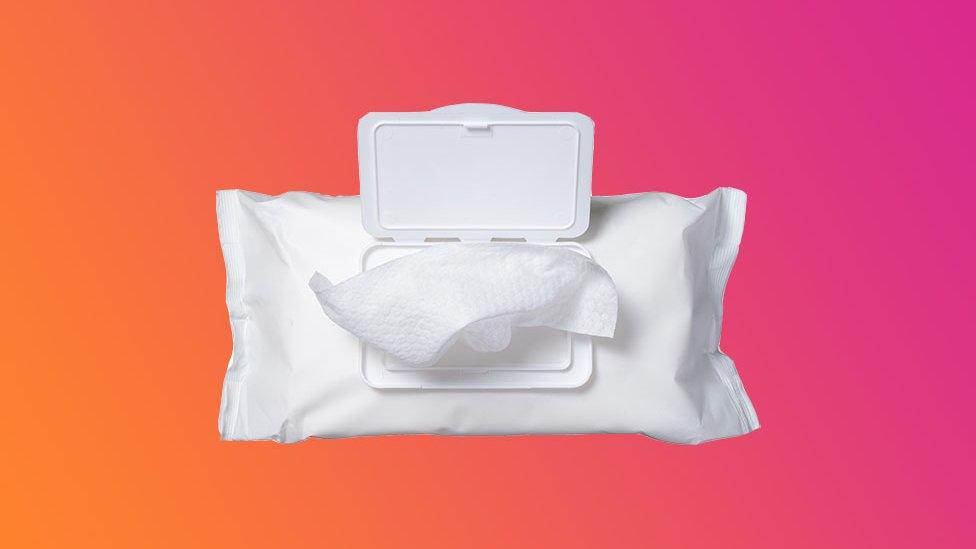Campaigners call for complete ban on plastic in wet wipes
- Published
- comments

Shops are not doing enough to protect beaches and seas from plastic pollution caused by wet wipes, say campaigners.
The Marine Conservation Society is calling on retailers to completely ban wet wipes containing plastic and make sure others are safe to flush.
They say wipes cause fatbergs in sewers and add to the microplastic pollution in the ocean.
In 2020 volunteers collected an average of 18 wet wipes per 100 metres on UK beaches, making them the third most common litter item found.
Microplastics are small pieces of plastic that are less than 5mm in length.
Microplastics happen when bigger bits of plastic - such as bottles, bags and containers break down in soil, or in the sea, and pollute the environment.
Glitter is also a microplastic.
Some plastics are so tiny they can't even be seen with the naked eye. They are called nanoplastics.
What is the problem with wet wipes?
All the things you didn't realise you need to know about fatbergs
Lots of wet wipes contain plastic and can't be flushed down the toilet because they don't break down in the sewers and can cause blockages and plastic pollution.
Some wipes are labelled as flushable as they do dissolve over time but some people say the labels are confusing and some wipes are labelled as flushable but aren't fully biodegradable.
The Marine Conservation Society wants all shops selling wet wipes to sign up to a specific test to get an official 'Fine to Flush' certificate.
This is a label on wipes which have been tested against Water Industry Specifications to make sure that it completely breaks down if flushed down the toilet.
Companies can get their products tested so they can add this official label to their products but they don't have to.
It costs the company money to have done and there are other tests which can be used to show wipes are biodegradable.
Dr Laura Foster, Head of Clean Seas at the Marine Conservation Society, said: "Our research has shown that, unfortunately, retailers simply aren't doing enough.
"Without firm commitments, legislation is going to be needed to make sure that Fine to Flush is mandatory."
What have retailers said?
Plastic lining the shore at the Thames Estuary in Kent
The charity says so far, Aldi is the only shop to have made sure all of their own brand flushable wipes meet the 'Fine to Flush' standard.
Boots, Morrison's, Tesco and Waitrose have promised to meet 'Fine to Flush' status by June 2021, but according to the group Asda, Lidl, Sainsbury's, Superdrug and Wilko are yet to make the same commitment to meet the deadline.
Newsround contacted these shops: Asda, Lidl and Sainsbury's say they are all working with suppliers towards 'Fine to Flush' standards.
Wilko and Superdrug say that their wipes do not contain plastic but they are not signing up to 'Fine to Flush' because they use a different way of testing their products.
If you can't see this vote, click here.
A Superdrug spokesperson said: "In January 2020 we launched our Own Brand Biodegradable Cleansing Facial Wipes and during 2021 all Own Brand Facial wipes will transition to biodegradable.
"Superdrug Own Brand flushable wipes do not contain any plastic materials and are flushable as defined by EDANA GD4 industry standard."
A spokesperson for Wilko said: "We're proud to be first retailer to go completely plastic free for all our wilko wipes.
"Back in March 2020 we switched to renewable plant fibres created from sustainable sources across all our 22 products. We also carry out the most rigorous testing including those for degradation."
What about non flushable wipes?
The Marine Conservation Society also want retailers to fully remove plastic from their non-flushable wet wipes.
Boots, Waitrose and Wilko are the only shops to have already done this and some others have said they will do it by the end of 2021.
Aldi, Asda, Co-op and Lidl, have not yet made any commitment, the charity reports.
Newsround contacted these stores. Asda says they have already removed plastic from their non flushable wipes.
Co-op says it is committed to moving to 100% plastic free wipes and Lidl says it has recently trialled a plastic free wipe and is careful to label products so people know when they can not be flushed down the toilet.
Aldi said it is trialling plastic-free wipes and is "working with suppliers to develop a suitable product".
Calls for a complete ban
Wet wipes causing a blockage at a house on the outskirts of Manchester
Dr Foster said: "By removing plastic from wet wipes we can move further away from our reliance on single-use plastics.
"Wet wipes should be considered similarly to items like cotton bud sticks and straws which are, in the most part, avoidable.
"That's why UK Governments need to ban plastic wet wipes and ensure that only products which have passed the 'Fine to Flush' standard can be sold as flushable - ensuring that anything that gets flushed will break down and not contribute to the plastic soup in our seas."
Plastic wet wipes should be completely banned to stop them polluting our seas and beaches, say campaigners.
What does the government say?
A spokesperson from the Department for Environment, Food and Rural Affairs said:
"We support the water industry's ongoing work to ensure that any wipes which are marked as being 'flushable', are plastic free and are truly flushable.
"We will continue to encourage the water and wet wipe industries to work together to develop an agreed standard for flushable wet wipes."
We want to know what you think. Get in touch below...
- Published13 September 2017
- Published18 April
- Published3 March 2020
- Published2 January 2020
